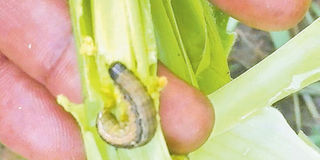Food shortage looms as pests invade 50pc of farms: report

What you need to know:
- To combat the menace, the government has deployed a team of agriculturalists to train farmers on how to control the situation.
Dar es Salaam. Crop pests have invaded nearly a half of Mainland Tanzania farms, a new report has revealed.
To combat the menace, the government has deployed a team of agriculturalists to train farmers on how to control the situation.
Moreover, pesticides worth $132,439 have been distributed to fight armyworms, rodents and crop diseases, but small-scale farmers complain that they reached them late.
“Farmers complained of having incurred huge costs to contain them,” according to the 2018 February Food Security Bulletin by the Ministry of Agriculture, Livestock and Fisheries.
It showed that the Ministry of Agriculture and that of State in the President’s Office (Regional Administration and Local Government) deployed the team of experts to train farmers on how to control the pests.
Smallholder farmer Mathias Ngalimoto, of Mtimbira Ward in Malinyi, Morogoro, is worried that maize will be scarce as farmers have not grown the cereal as rodents had been devouring crops.
“We will face an acute shortage of maize this season,” laments Mr Ngalimoto.
He is also deeply worried about armyworms and other pests that invaded paddy fields, causing a food shortage to families that normally depend on rice for survival.
“The government has brought enough pesticides, but the planting season is over. As a result, most of the pesticides will not be used this farming season,” says Mr Ngalimoto.
According to experts, rodents constitute the largest group of mammals in terms of species numbers and diversity. They play an important role as reservoirs and carriers of zoonotic diseases, and they are responsible for substantial damages of food and cash crops, industrial products, and occasionally forest plants, the ministry’s bulletin reads.
In Tanga, Songwe and a number of other regions, all districts are at risks of food shortages as rodents invaded maize farms, according to the report.
“Rodents have destroyed over 32,000 hectares of crops putting thousands of people at serious risks of food shortages,” report clarifies.
According to the report, prospects of bumper harvests following good rain in recent months have been shattered, with farmers realising that most of the maize in their fields had been destroyed.
“Although an estimation of crop losses due to rodents has not been done countrywide, damage to crops is widespread and tends to be sporadic.”
Rodent outbreaks normally occur in one area for about one or few seasons and cause great losses, after which the populations decline tremendously and hence cause less damage to crops, according to experts. However, in some areas large losses of crops are sustained every year, indicating that the general pattern of rodent infestation is not uniform, according to experts.
Agricultural Non-State Actors Forum, Mr Audax Rukonge suggests that the government the private sector team up to invest in research and development to ensure pesticides are supplied on time and are made available at reasonable prices.




